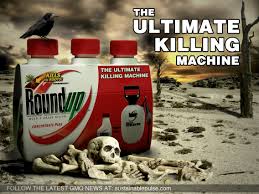Back in 1974, the agricultural multinational Monsanto developed a class of herbicides using glyphosate as the key ingredient. By the 1990s, the company had created corn, soy and cotton seeds genetically altered to resist glyphosate herbicides, meaning farmers could kill weeds without fearing for the health of their crops. Today, Monsanto’s Roundup is the most widely used weed-killer in the world.
One problem: we now know with certainty that glyphosate is carcinogenic to humans and animals. Though Roundup has been plagued by controversy for years, a report released this March by scientists affiliated with the World Health Organization definitively linked the herbicide to increased risks for non-Hodgkin lymphoma, as well as DNA and chromosomal damage in mammals.
Roundup is only one of tens of thousands of chemicals we encounter every day in our food, clothing, furniture, electronics and cosmetics. Over 84,000 chemicals are used in U.S. commerce, according to the Environmental Protection Agency, most of which have never been tested for potentially toxic effects on human and wildlife health and the environment. The Human Experiment, a new documentary narrated by Sean Penn and directed by journalists Dana Nachman […]











This is also the reason why there is so much resistance to mandatory vaccination. Vaccines are a witches brew of chemicals and are neither completely safe nor 100% effective. We need to do a rethink on the whole issue of vaccines.
I was not sick all winter. Neither was my wife. Then we went to the doctors office for a quarterly checkup and now we’re both sick. I did not get any vaccines and got over the illness in a couple of days. My wife got two vaccines; one for pneumonia and one for viruses, and she’s still very sick and may even need to go to the hospital. What good did the vaccine do??????